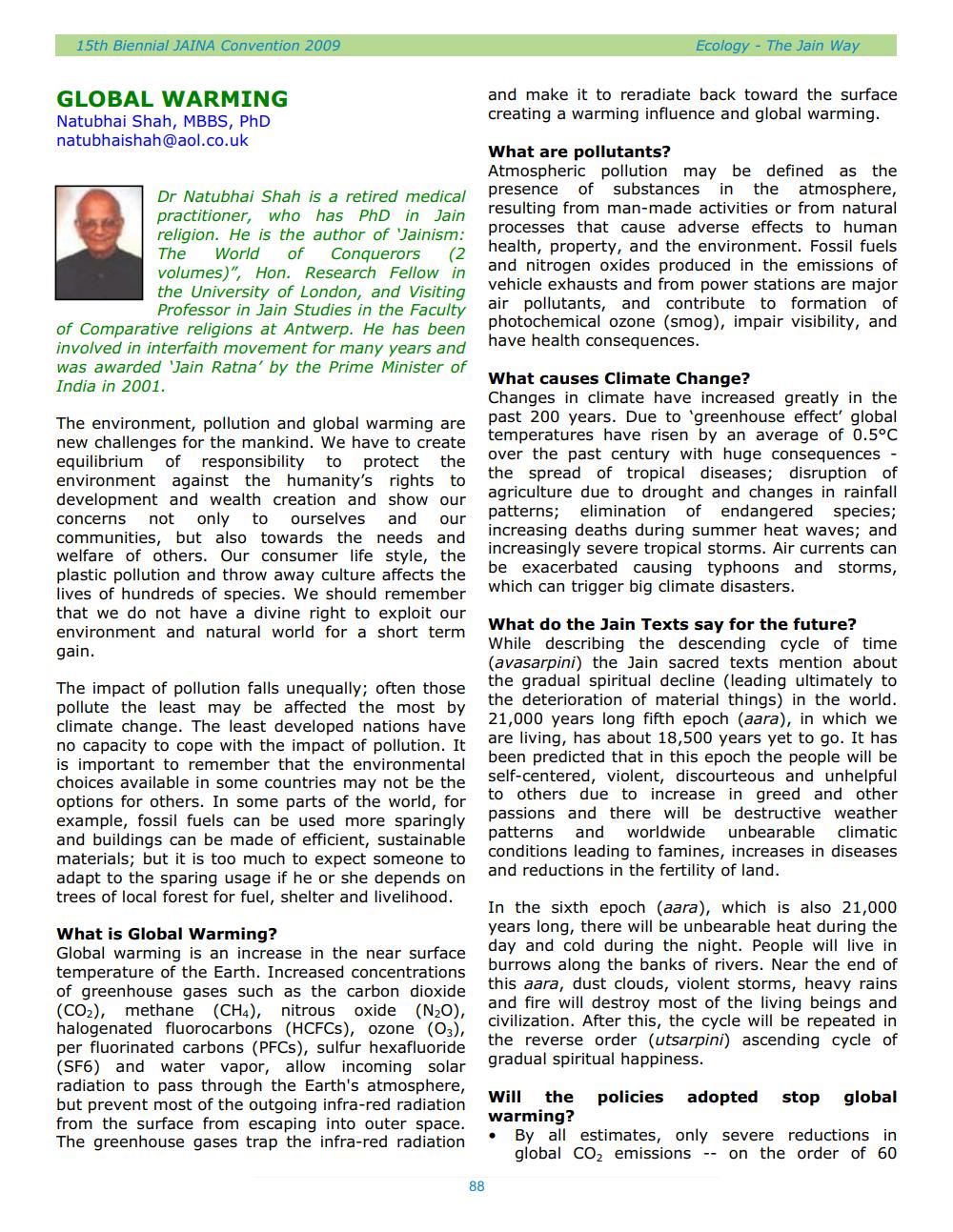________________
15th Biennial JAINA Convention 2009
GLOBAL WARMING Natubhai Shah, MBBS, PhD
[email protected]
Dr Natubhai Shah is a retired medical practitioner, who has PhD in Jain religion. He is the author of 'Jainism: The World of Conquerors (2 volumes)", Hon. Research Fellow in the University of London, and Visiting Professor in Jain Studies in the Faculty of Comparative religions at Antwerp. He has been involved in interfaith movement for many years and was awarded 'Jain Ratna' by the Prime Minister of India in 2001.
The environment, pollution and global warming are new challenges for the mankind. We have to create equilibrium of responsibility to protect the environment against the humanity's rights to development and wealth creation and show our concerns not only to ourselves and our communities, but also towards the needs and welfare of others. Our consumer life style, the plastic pollution and throw away culture affects the lives of hundreds of species. We should remember that we do not have a divine right to exploit our
environment and natural world for a short term gain.
The impact of pollution falls unequally; often those pollute the least may be affected the most by climate change. The least developed nations have no capacity to cope with the impact of pollution. It is important to remember that the environmental choices available in some countries may not be the options for others. In some parts of the world, for example, fossil fuels can be used more sparingly and buildings can be made of efficient, sustainable materials; but it is too much to expect someone to adapt to the sparing usage if he or she depends on trees of local forest for fuel, shelter and livelihood.
What is Global Warming? Global warming is an increase in the near surface temperature of the Earth. Increased concentrations of greenhouse gases such as the carbon dioxide (CO2), methane (CH4), nitrous oxide (NO), halogenated fluorocarbons (HCFCs), ozone (03), per fluorinated carbons (PFCs), sulfur hexafluoride (SF6) and water vapor, allow incoming solar radiation to pass through the Earth's atmosphere, but prevent most of the outgoing infra-red radiation from the surface from escaping into outer space. The greenhouse gases trap the infra-red radiation
Ecology - The Jain Way
and make it to reradiate back toward the surface creating a warming influence and global warming.
What are pollutants?
Atmospheric pollution may be defined as the presence of substances in the atmosphere, resulting from man-made activities or from natural processes that cause adverse effects to human health, property, and the environment. Fossil fuels and nitrogen oxides produced in the emissions of vehicle exhausts and from power stations are major air pollutants, and contribute to formation of photochemical ozone (smog), impair visibility, and have health consequences.
What causes Climate Change?
Changes in climate have increased greatly in the past 200 years. Due to 'greenhouse effect' global temperatures have risen by an average of 0.5°C over the past century with huge consequences the spread of tropical diseases; disruption of agriculture due to drought and changes in rainfall patterns; elimination of endangered species; increasing deaths during summer heat waves; and increasingly severe tropical storms. Air currents can be exacerbated causing typhoons and storms, which can trigger big climate disasters.
88
What do the Jain Texts say for the future? While describing the descending cycle of time (avasarpini) the Jain sacred texts mention about the gradual spiritual decline (leading ultimately to the deterioration of material things) in the world. 21,000 years long fifth epoch (aara), in which we are living, has about 18,500 years yet to go. It has been predicted that in this epoch the people will be self-centered, violent, discourteous and unhelpful to others due to increase in greed and other passions and there will be destructive weather patterns and worldwide unbearable climatic conditions leading to famines, increases in diseases and reductions in the fertility of land.
In the sixth epoch (aara), which is also 21,000 years long, there will be unbearable heat during the day and cold during the night. People will live in burrows along the banks of rivers. Near the end of this aara, dust clouds, violent storms, heavy rains
and fire will destroy most of the living beings and
civilization. After this, the cycle will be repeated in
the reverse order (utsarpini) ascending cycle of gradual spiritual happiness.
Will the policies adopted stop global warming?
⚫ By all estimates, only severe reductions in global CO2 emissions on the order of 60
